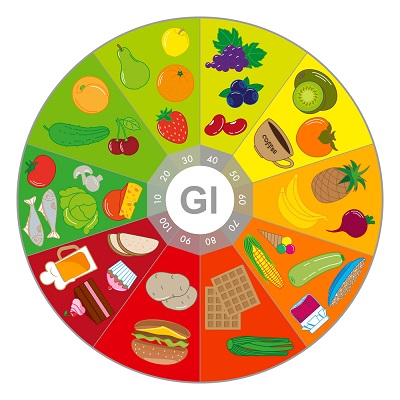 You may have head the term “glycemic index” or “GI” in the media and as a suggested way to lose weight. Everyone seems to talk about it but sometimes it can seem like another language, or just another fad diet. However, the glycemic index is a real thing and can have a huge impact on your health.
You may have head the term “glycemic index” or “GI” in the media and as a suggested way to lose weight. Everyone seems to talk about it but sometimes it can seem like another language, or just another fad diet. However, the glycemic index is a real thing and can have a huge impact on your health.
So what exactly is it?
The glycemic index is a rating given to particular foods that contain carbohydrates based on what effect it has on the body’s glucose levels. The rating is used to show how much your blood sugar level increases when you eat a certain kind of food, or the food’s glycemic load.
The standard measure is 1 to 100 and foods can be rated anywhere in between.
Essentially, the foods that take longer to absorb will score low on the rating and foods that are absorbed quickly will score highly. For a food to be rated it has to achieve a score of 55 or below.
Typical foods that have a low glycemic index include most fruits and vegetables and some wholegrains such as rice. It is not as simple as giving ratings to foods; the way in which foods are prepared and cooked can have a huge influence on the glycemic rating.
Why does it matter how quickly food is absorbed?
It matters because eating foods that are absorbed quickly will cause your blood sugar level to rise, peak, and then crash down again.
All this up and down is not good for anyone’s health, and is potentially very dangerous for some people with health issues, particularly those with prediabetes or those already diagnosed.
Insulin triggers, those foods with a high GI are also implicated in obesity and weight gain.
Weight Management
The glycemic index has many effects on your health, but particularly when it comes to your weight. Research has constantly supported the notion that a diet that largely consists of foods that are high on the glycemic index lead to obesity and other related health problems.
Moreover, indicators of general health are much worse than when a diet does not contain both high and low glycemic index foods.
Additionally, research has also found that those individuals who follow a low glycemic index diet for a long period of time (several years), were much less likely to develop diseases such as diabetes, cardiovascular disorders and potentially even some forms of cancer.
While research is still at its early stages for some of this area, the results are looking promising. It is thought that high glycemic index foods cause these peaks in blood sugar levels and this is hard for the body to keep up with. This continuous up and down places the body under extra stress that it can only handle for so long.
However, there are countries in the world that eat high glycemic index foods such as rice that do not have the high levels of obesity that Western countries do. This is likely to be due to a combination of factors and the varied diet that these cultures consume.
Pregnancy
Although there is less robust scientific research for this, it seems that a low glycemic diet can help women who are pregnant or attempting to become pregnant, this is particularly the case in pregnant women who also have diabetes.
When following a low glycemic index diet, pregnant women were much better able to control their insulin levels and therefore the amount of this type of stress their body was under.
Balanced Diet
However, if you solely focus on the glycemic index of a food and fail to look at food as a whole, you may risk an unbalanced diet.
If you follow a diet solely low in glycemic index, it is possible that you will end up putting weight on and becoming unhealthy – this brings it’s own health problems.
For example, pasta has a lower glycemic index than some fruits, but this does not necessarily mean it is wholly better for you.
In order to achieve the health benefits you need to consider a foods glycemic index in conjunction with the normal dietary advice.
This way you can ensure your blood sugar levels remain constant throughout the day, and avoid those peaks and subsequent crashes in your sugar levels. Not only will this make you feel better, but will also benefit your overall health.






